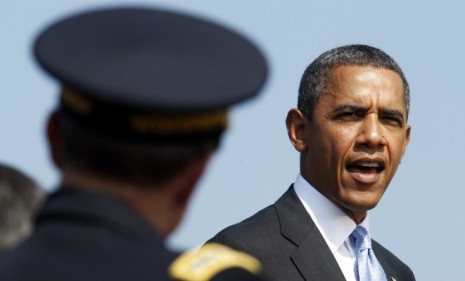Leaked: The legal case for killing Anwar al-Awlaki
Does the Obama administration's secret memo adequately defend the decision to launch a lethal drone strike against a U.S. citizen?

A free daily email with the biggest news stories of the day – and the best features from TheWeek.com
You are now subscribed
Your newsletter sign-up was successful
A secret Obama administration legal memo cleared the way for the killing of radical, U.S.-born Muslim cleric Anwar al-Awlaki in Yemen, declaring that it would be legal for the U.S. to kill him despite an executive order banning assassinations, according to a report in The New York Times. The "crucial" legal analysis, written a year before the drone strike that killed Awlaki last month, said the killing would only be justified if Awlaki, a U.S. citizen, could not be taken alive. Does this 50-page memo settle the debate over the legality of Awlaki's killing?
No. The government needs to defend its actions openly: "As American citizens we have a right to know when our own government believes it may execute us without a trial," says David Cole at The New York Review of Books. Everybody knows war isn't pretty, but "leaked accounts to The New York Times are no substitute" for openness. "As long as the Obama administration insists on the power to kill the people it was elected to represent — and to do so in secret, on the basis of secret legal memos — can we really claim that we live in a democracy?"
The Week
Escape your echo chamber. Get the facts behind the news, plus analysis from multiple perspectives.

Sign up for The Week's Free Newsletters
From our morning news briefing to a weekly Good News Newsletter, get the best of The Week delivered directly to your inbox.
From our morning news briefing to a weekly Good News Newsletter, get the best of The Week delivered directly to your inbox.
Actually, the memo is quite comforting: After the way the Bush administration's "torture memos" tossed legal precedent out the window, says Bill Nelligan at Carlisle Policy Forum, it is encouraging to see how "careful and cautious" Obama's legal minds are. The authors of the memo outlined several obstacles to the killing of an American, "explaining how each was overruled in this specific instance." That "gives me a great deal of optimism about the rule of law under this president."
"A secret memo, a secret panel, a novel process"
And the memo was not even necessary: The "caterwauling" over Awlaki's death is silly, says Don Surber at the Charleston, W.V., Daily Mail. The man wasn't "hiding" in Yemen. He had lived there nearly his entire life and was at war with the U.S. It shouldn't take an official memo for people to realize that we don't owe an enemy leader with whom we're at war the niceties of capture and a public trial. "He was not serious about his 'citizenship' — why should we be?"
"NYT's war on the war on terrorism"
A free daily email with the biggest news stories of the day – and the best features from TheWeek.com
-
 Is Andrew’s arrest the end for the monarchy?
Is Andrew’s arrest the end for the monarchy?Today's Big Question The King has distanced the Royal Family from his disgraced brother but a ‘fit of revolutionary disgust’ could still wipe them out
-
 Quiz of The Week: 14 – 20 February
Quiz of The Week: 14 – 20 FebruaryQuiz Have you been paying attention to The Week’s news?
-
 The Week Unwrapped: Do the Freemasons have too much sway in the police force?
The Week Unwrapped: Do the Freemasons have too much sway in the police force?Podcast Plus, what does the growing popularity of prediction markets mean for the future? And why are UK film and TV workers struggling?